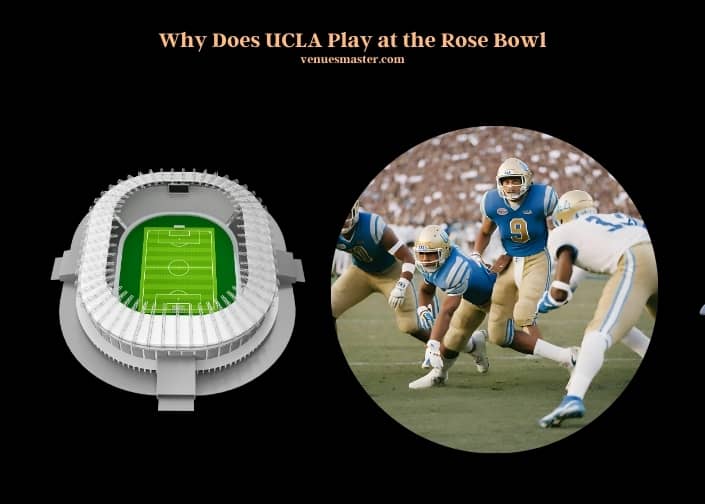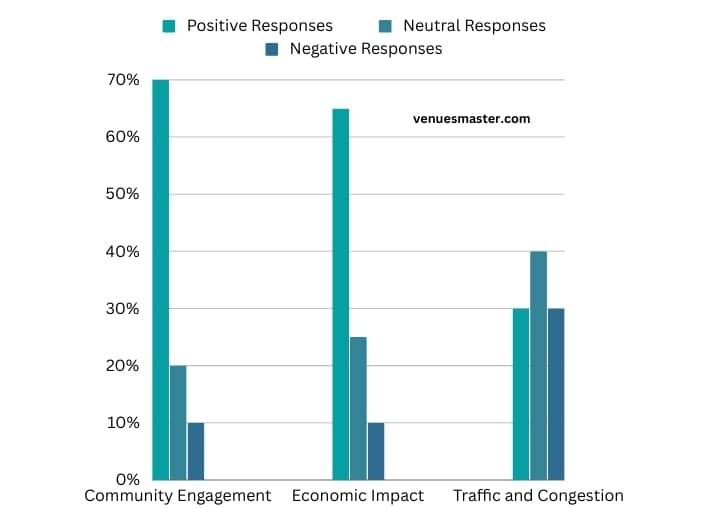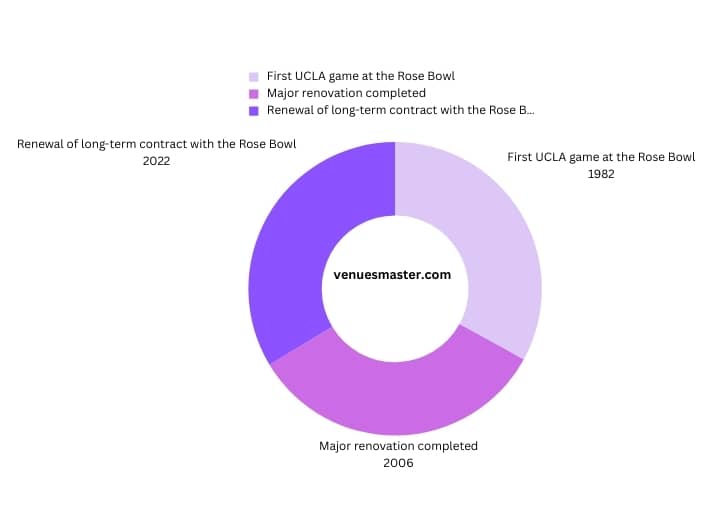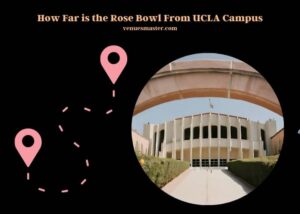Published on: 24 December 2023
Written by Najrul / Fact-checked by Asma Abir
UCLA plays at the Rose Bowl primarily due to the lack of a sufficiently large stadium on its own campus. The Rose Bowl, with its larger capacity and historic significance, offers an ideal venue for UCLA’s home football games.
The relationship between UCLA and the Rose Bowl is a storied one, steeped in tradition and mutual benefit. Located in Pasadena, the Rose Bowl is a short distance from UCLA’s campus in Westwood, making it accessible for students, faculty, and the vast alumni network. This proximity has fostered a strong sense of community and school spirit, with game days turning into significant events for both UCLA and the city of Pasadena.

The choice of the Rose Bowl as UCLA’s football venue has also been strategic. The stadium’s large capacity allows for a greater fan turnout, creating an electrifying atmosphere that enhances the game day experience. This setting not only excites spectators but also serves as a powerful tool in recruiting top athletes.
The prestige of the Rose Bowl, known for hosting major events like the annual Rose Bowl Game, adds a layer of allure and history to UCLA’s football program. Furthermore, the economic impact on Pasadena is notable, with local businesses benefiting significantly from the influx of fans on game days. This symbiotic relationship highlights the importance of the Rose Bowl not just as a sports venue, but as a cultural and economic catalyst for the region.
UCLA’s Historic Ties to the Rose Bowl
UCLA’s decision to play at the Rose Bowl is steeped in history, reflecting a deep connection between the university and this iconic stadium. The Rose Bowl, known for its grandeur and prestige in college football, has been the backdrop for many of UCLA’s defining moments in the sport. This relationship began in 1982, marking a significant shift in the university’s football narrative. The stadium, with its vast capacity and storied past, offered a perfect stage for UCLA’s growing football ambitions.
The impact of this move extended beyond the field. It fostered a unique bond with the local community, turning game days into a celebrated local tradition. The Rose Bowl became more than just a venue; it was a symbol of pride and excellence for both UCLA and the Pasadena community. This partnership also brought economic benefits to the area, with game days boosting local business and tourism.
Notable games at the Rose Bowl, featuring UCLA, have etched themselves into the annals of college football history. These games were not just athletic contests but cultural events, drawing in fans from across the nation and cementing the Rose Bowl’s status as a legendary football venue.
Strategic Benefits of UCLA’s Rose Bowl Games
Playing at the Rose Bowl offers UCLA multiple strategic advantages. The stadium’s large capacity and state-of-the-art facilities provide an unparalleled game day experience for both players and fans. Its location, close to UCLA’s campus, ensures a strong turnout from the university’s student body and alumni, creating a formidable home-field advantage.
The Rose Bowl’s prestige is a significant draw for prospective student-athletes. Its history and the atmosphere it generates are powerful tools in recruiting top talent. Additionally, the stadium’s accessibility, with well-connected transportation routes, makes it an ideal venue for both local and visiting supporters.
Economic Impact of UCLA’s Games at the Rose Bowl
UCLA’s football games at the Rose Bowl have a substantial economic impact on the local community. On game days, there’s a noticeable spike in business for local establishments, from restaurants to retail stores. This influx of fans translates into increased sales, providing a significant boost to the local economy.
The university also benefits financially from these games through ticket sales and merchandising. This revenue supports not only the football program but also other athletic and academic initiatives.
Cultural and Community Engagement at the Rose Bowl
UCLA’s presence at the Rose Bowl fosters a vibrant cultural and community engagement. The games are more than sporting events; they are gatherings that bring together students, alumni, and local residents. These events serve as a catalyst for community programs and initiatives, strengthening the bond between the university and the Pasadena community.
Community Perception of UCLA Games at the Rose Bowl
| Aspect | Positive Responses | Neutral Responses | Negative Responses |
| Community Engagement | 70% | 20% | 10% |
| Economic Impact | 65% | 25% | 10% |
| Traffic and Congestion | 30% | 40% | 30% |

The cultural significance of these games extends beyond the local community, highlighting the role of college football in American culture. UCLA games at the Rose Bowl have become a tradition, embodying the spirit of competition and camaraderie.
Future Prospects and Challenges at the Rose Bowl
Looking ahead, UCLA faces both opportunities and challenges in maintaining its presence at the Rose Bowl. The stadium requires ongoing maintenance and upgrades to remain a top-tier venue. Negotiations for long-term contractual agreements are crucial to secure UCLA’s future at the Rose Bowl.
UCLA’s Tenure at the Rose Bowl: Key Milestones
| Year | Milestone |
| 1982 | First UCLA game at the Rose Bowl |
| 2006 | Major renovation completed |
| 2022 | Renewal of long-term contract with the Rose Bowl |

Evolving fan preferences and sustainability initiatives present new challenges. UCLA must adapt to changing times while preserving the traditions and legacy of playing at this historic venue.
FAQs
Is the Rose Bowl UCLA’s Official Stadium?
The Rose Bowl, while not officially UCLA’s home stadium, has become synonymous with UCLA football. The university’s main campus lacks a stadium large enough to accommodate its football games, leading to the selection of the Rose Bowl as its primary venue for home games. This arrangement has provided UCLA with a venue that not only meets its capacity needs but also adds to the prestige and experience of its football program. The Rose Bowl’s historic significance and its larger capacity make it an ideal fit for UCLA’s high-profile games, offering an enhanced experience for players and fans alike.
What Led to UCLA’s Initial Move to the Rose Bowl?
UCLA’s move to the Rose Bowl in 1982 was driven by a need for a larger and more suitable venue for its football games. Prior to this, UCLA played its home games at the Los Angeles Memorial Coliseum, which it shared with the University of Southern California (USC). The decision to move was influenced by the desire for a distinct home field, as sharing with a crosstown rival was not ideal. The Rose Bowl offered UCLA its own space, allowing for a unique identity and atmosphere distinct from USC, fostering a stronger sense of community and school spirit.
How Does UCLA’s Participation in the Rose Bowl Affect Michigan’s Quest for Glory?
UCLA’s participation in the Rose Bowl could impact Michigan’s quest for achieving rose bowl victory. The success or failure of UCLA in the game may affect Michigan’s chances of securing the victory they desire. It is important to keep a close eye on the game’s outcome and its potential impact.
How Does the Rose Bowl Enhance UCLA’s Football Program?
Playing at the Rose Bowl enhances UCLA’s football program by providing a high-profile and historic venue that attracts players and fans. The stadium’s large capacity allows for a greater number of fans to attend games, creating a vibrant and energetic atmosphere. This environment is not only exciting for spectators but also acts as a powerful recruiting tool for attracting top high school talent. The prestige associated with the Rose Bowl, known for hosting major events like the annual Rose Bowl Game and the 1994 FIFA World Cup, adds to the allure of UCLA’s football program.
Are There Any Unique Traditions at UCLA Games at the Rose Bowl?
UCLA games at the Rose Bowl are known for unique traditions that enhance the game day experience. One such tradition is the “Bruin Walk,” where fans line up to cheer on the players as they walk into the stadium. Another is the halftime show performed by the UCLA Marching Band, known for its high-energy performances and intricate formations. These traditions contribute to a festive atmosphere, making UCLA games at the Rose Bowl memorable for students, alumni, and fans, and they play a significant role in building a sense of community and school pride.
How Does the Rose Bowl’s Location Benefit UCLA?
The Rose Bowl’s location in Pasadena, relatively close to UCLA’s campus in Westwood, is beneficial for both the university and its supporters. This proximity makes it convenient for students, faculty, and alumni to attend games, fostering a strong sense of community and school spirit. The location also allows for easy access for fans from across the Los Angeles area.
Pasadena’s scenic setting and amenities offer an enjoyable game day experience, with plenty of dining and recreational options available for fans before and after games.
What Impact Does UCLA Playing at the Rose Bowl Have on Pasadena?
UCLA playing its home games at the Rose Bowl has a significant impact on the city of Pasadena. Game days bring thousands of fans to the city, boosting local businesses, especially those in the hospitality and retail sectors. This influx of visitors contributes to the local economy, with hotels, restaurants, and shops experiencing increased patronage.
The presence of UCLA football adds to Pasadena’s cultural and entertainment offerings, enhancing its reputation as a vibrant city and a destination for sports and leisure activities.
Summary
UCLA’s decision to play at the Rose Bowl is a multifaceted story, intertwining history, strategy, economics, and culture. From its historical significance and strategic advantages to its economic impact and community engagement, the relationship between UCLA and the Rose Bowl is a testament to the enduring allure of college football. As UCLA looks to the future, it faces challenges but also opportunities to build on this storied partnership.




